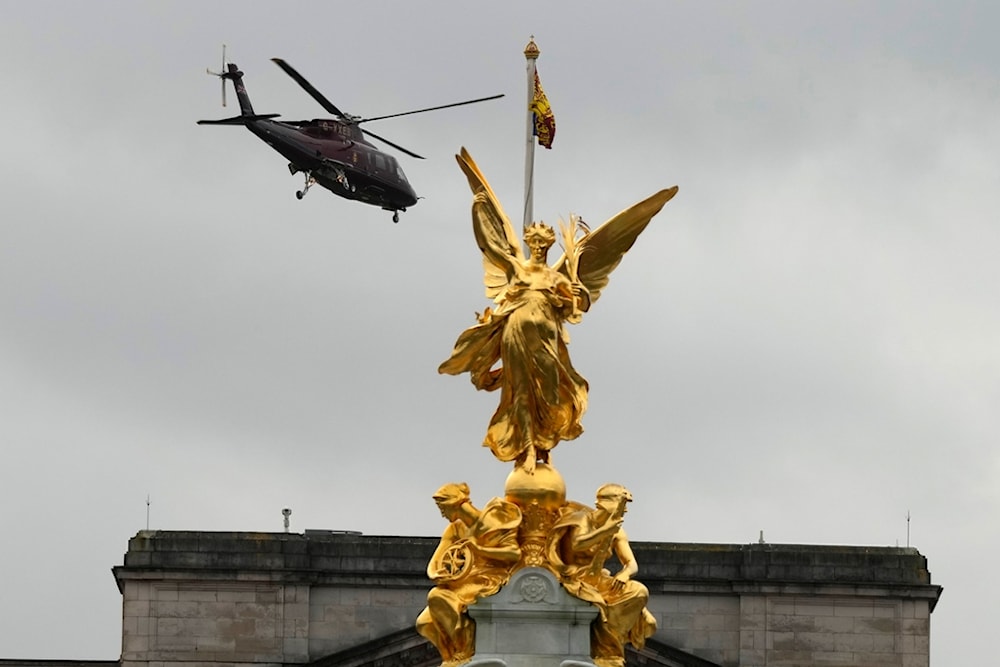UK businesses turn to overseas recruitment amidst worker shortage
Despite wage increases, reluctance to fill positions persists, prompting employers to seek foreign workers.
-

A helicopter departs from Buckingham Palace believed to be carrying King Charles III and Queen Camilla in London, Tuesday, Feb. 6, 2024. (AP)
The National Institute of Economic and Social Research (NIESR) warned that businesses are growing increasingly dissatisfied with their efforts to recruit British workers and are turning to international recruitment to address vacancies.
According to The Telegraph, the number of companies seeking sponsorship to hire overseas workers has doubled over the past two years, reflecting a trend driven by a significant exodus of British workers from the job market.
Over 9 million individuals of working age have withdrawn from the job market, with the economically inactive population swelling by 884,000 since before the pandemic. Despite significant increases in wages, many of these individuals remain hesitant to fill the more than 900,000 available job openings. As a result of this, employers have found themselves compelled to seek crucial staff from overseas.
"International workers are basically propping up the labour market in many ways," Max Mosley, an economist at the National Institute of Economic and Social Research, told The Telegraph. "It is very challenging for employers – the kind of tools they have at their disposal, to raise wages to try to compete, does not work any more."
The number of people receiving out-of-work benefits has surpassed 5 million, marking a notable increase from 3.5 million in 2015. The Office for National Statistics (ONS) has identified 2.8 million individuals who report being neither employed nor actively seeking employment due to long-term illness.
Despite a 6.5% rise in average wages in the year leading up to November, claimants are opting to stay on benefits for longer periods rather than pursuing available job opportunities, as noted by the NIESR.
Read more: Red Sea shipping attacks may affect UK economy: Finance Minister
According to Home Office data, the issuance of new work visas surged to 169,000 last year, a 50% increase from pre-COVID levels. Moreover, the number of businesses authorized to sponsor visas has more than doubled since 2021, reaching 76,310, indicating the challenges faced by employers in recruiting from the existing UK workforce.
"That is why you might see them look towards international workers. Previously only around 30,000 companies had been registered," Mosley said. The prompt increase in businesses registering came "right at the point the supply of domestic workers got really tight, so over the pandemic in 2021", he said, "reflecting firms potentially becoming frustrated."
David Miles, an executive member of the Office for Budget Responsibility (OBR), cautioned against the government's reliance on immigration as a means to stimulate economic growth and alleviate Britain's debts.
He said that migration cannot serve as a panacea for the country's long-standing financial challenges. Instead, he advised Prime Minister Rishi Sunak that reducing the benefits expenditure and increasing employment rates would offer unequivocal benefits to the economy.
According to the Office for National Statistics (ONS), net migration into the UK reached 672,000 in the 12 months leading up to June 2023, contributing to a projected population of 70 million by the end of 2026.
In an attempt to curb migrant inflows, the government is raising the salary threshold for skilled workers immigrating to the UK. Effective April, the minimum salary requirement for sponsoring a visa will increase from £26,200 to £38,700, with exceptions made for healthcare and education professionals.
Read more: British citizens welcome 2024 with 5% hike in energy bills
The pressure is mounting on UK Chancellor Jeremy Hunt to enact tax cuts aimed at enhancing the appeal of work.
James Reed, chief executive of Reed Jobs, has urged the Chancellor to address this by unfreezing income tax thresholds. His proposal aims to "make work pay" and encourage individuals to rejoin the workforce.
"There are a lot of reasons why someone who wasn’t working might think of returning to work at the moment, and making work pay is a really important part of that," Reed said.
Traditionally, income tax thresholds are adjusted to keep pace with inflation. However, since April 2022, these thresholds have remained stagnant. The freeze was initially announced by Rishi Sunak during his tenure as Chancellor in 2021 and was later extended by Jeremy Hunt until 2028.
As a result of this freeze, escalating wages amid the cost of living crisis have led to more individuals being pushed into higher tax brackets. This phenomenon, often referred to as fiscal drag, acts as a stealth tax, increasing the tax burden on individuals without explicit tax rate changes.
"We have been through a period of quite severe inflation. The people who are caught in those thresholds now are quite different to what was originally planned," Reed said. "The more people who are working who could be made free of income tax, the better, because it encourages work. That has been going in the opposite direction."
Read more: UK economy continues tumbling, borrowing rate hits 2008-high

 5 Min Read
5 Min Read










